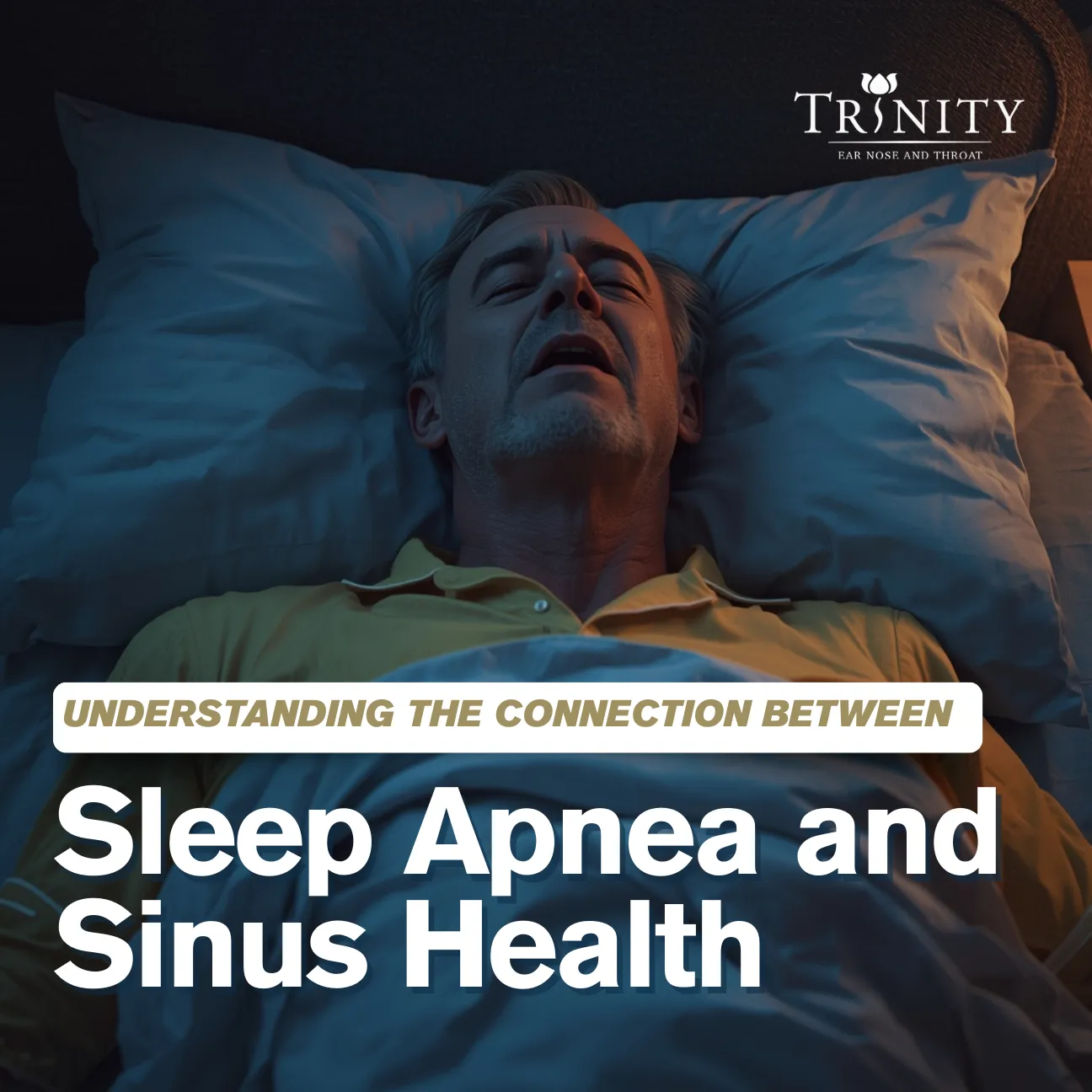Understanding the Connection Between Sleep Apnea and Sinus Health
Chronic sinus issues can make restful sleep difficult and may worsen obstructive sleep apnea (OSA), a disorder linked to snoring, fatigue, and serious health risks. This blog explains the connection between sinus health and OSA and highlights treatment options available at Trinity ENT in Gilbert, Mesa, and Tempe to help patients breathe and sleep better.
Understanding the Connection Between Sleep Apnea and Sinus Health
Quality sleep plays a critical role in maintaining overall health. From supporting cognitive function to regulating mood and energy, getting enough restorative sleep each night is essential for daily well-being.
Unfortunately, chronic sinus issues can make it harder to get the sleep your body needs—and in some cases, may contribute to or worsen obstructive sleep apnea (OSA), a serious sleep-related breathing disorder.
In this article, we’ll explore how sinus problems can impact sleep and increase the likelihood of developing sleep apnea. We’ll also discuss how residents of Mesa, Tempe, and Gilbert can find effective treatment options through ENT care.

💤 What Is Obstructive Sleep Apnea?
Obstructive sleep apnea (OSA) is a common sleep disorder in which the airway becomes partially or fully blocked during sleep, causing pauses in breathing. These interruptions may happen dozens—or even hundreds—of times per night, preventing restful, oxygen-rich sleep.
Common symptoms of sleep apnea include:
- Loud, frequent snoring
- Waking up gasping or choking
- Morning headaches
- Daytime fatigue or drowsiness
- Brain fog or difficulty concentrating
- Mood swings or irritability
⚠️ Untreated OSA can increase the risk for serious health conditions, including high blood pressure, heart disease, stroke, and type 2 diabetes. If you suspect you have sleep apnea, consult with a healthcare provider for evaluation.
🤧 How Sinus Problems Contribute to Sleep Apnea
Sinus and nasal health are closely tied to sleep quality. In fact, certain chronic sinus conditions may increase the severity or frequency of sleep apnea symptoms.
Here’s how:
1. Nasal Inflammation and Swelling
Swollen sinus tissues—often caused by allergies, sinusitis, or chronic inflammation—can narrow the upper airway and contribute to breathing disruptions during sleep.
2. Nasal Congestion and Obstruction
Blocked nasal passages force many people to breathe through their mouths while sleeping. Mouth breathing is less effective, and may worsen the airway collapse that contributes to sleep apnea.
3. Poor Sleep from Sinus Symptoms
Symptoms like nasal blockage, post-nasal drip, and facial pressure can prevent deep, uninterrupted sleep. Over time, the body becomes more susceptible to disordered sleep breathing patterns.
😴 The result? A reinforcing cycle where sinus issues and sleep apnea aggravate each other—leading to chronic fatigue, fragmented sleep, and long-term health effects if left untreated.
🩺 Sinus & Sleep Apnea Treatment Options in Gilbert, Mesa, and Tempe
At Trinity ENT, we understand that sinus and sleep disorders often go hand in hand. Our team offers a range of solutions designed to address both the root cause and the symptoms.
✅ Medications to Support Sinus Health
- Antihistamines – Help reduce allergy-related inflammation
- Nasal decongestants – Break up mucus and improve airflow
- Saline sprays – Flush out irritants and moisturize nasal passages
- Topical nasal steroids – Reduce long-term inflammation
These treatments may support better breathing and reduce airway resistance, but they are often used in combination with more targeted interventions for sleep apnea.
✅ ENT Procedures and Sleep Apnea Support
- CPAP Therapy
The most common and effective treatment for OSA, CPAP uses a machine to keep the airway open during sleep. - Balloon Sinuplasty
A minimally invasive procedure that uses a small balloon to open blocked sinus passages and improve drainage. - Septoplasty
Surgical correction of a deviated septum, which can improve nasal airflow and reduce upper airway obstruction. - Sublingual Immunotherapy (SLIT)
A long-term allergy treatment that may reduce inflammation and improve nasal breathing by building tolerance to allergens.
⚠️ Note: SLIT allergy drops may be considered off-label in the U.S. for some allergens. Consult your provider about FDA-approved options and clinical suitability.
🌟 Why Choose Trinity ENT?
At Trinity ENT, we combine advanced diagnostic tools with personalized care plans to treat the overlapping causes of sinus conditions and sleep apnea. Whether you’re from Gilbert, Tempe, Mesa, or surrounding communities, our team is here to help you breathe better—and sleep better.
🛑 Important: Treatment decisions should always be made in consultation with a licensed medical provider. Individual outcomes may vary depending on the underlying condition and treatment approach.
📅 Schedule a Consultation
If you’re tired of poor sleep, chronic congestion, or waking up feeling unrested, it may be time to explore treatment options.
👉 Call Trinity ENT today or request an appointment online to learn more about how we can support your sinus and sleep health.
The information provided in this article is for informational and educational purposes only and does not constitute medical advice. It is not intended to diagnose, treat, cure, or prevent any disease or medical condition. Always seek the guidance of your physician or other qualified healthcare provider with any questions you may have regarding a medical condition or treatment.
Results may vary: Treatment outcomes and health experiences may differ based on individual medical history, condition severity, and response to care.
Emergency Notice: If you are experiencing a medical emergency, call 911 or seek immediate medical attention.




